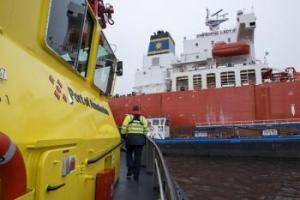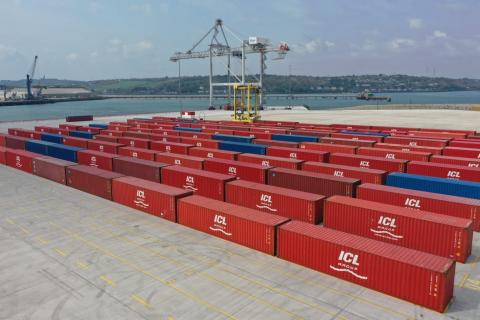Harbour Master
Harbour Masters
Worldwide there are approximately 3,000 merchant ports and the work of the Harbour Master can vary widely from country to country and from port to port even within the same country.


The Port of Cork Company (PoCC) has published its Annual Report for 2021, highlighting strong financial performance, with turnover and profit improvement as a result of growth in port traffic combined with a strong focus on efficiency.
To view or download a copy of the PoCC Annual Report 2021 at 98 pages readers are invited to see here:
https://www.portofcork.ie/index.cfm/page/annualreports1?twfId=2031&download=true
Steady recovery
This report shows a steady recovery as a result of Covid-19 and Brexit challenges, with an 18% increase in turnover from €33.7m in 2020 to €39.8m in 2021. The company’s profits also increased, with an operating profit of €7.8 million (€6.1m in 2020).
The Port of Cork is the second largest port in the Republic of Ireland in terms of turnover, handling all cargo types including lift-on lift-off, bulk liquid, bulk solid, break bulk, ro-ro and cruise ships. In 2021, the Ports of Cork and Bantry reported a total consolidated traffic throughput of 10.6 million tonnes in line with 2020.
Due to the retention of existing traffic and the commencement of a number of services direct to Europe from Ringaskiddy following Brexit, the number of TEU increased by 13% to a record 281,816 TEU (2020: 250,209 TEU).
Imports improved
The liquid and break bulk, lift-on lift-off containers, Con-Ro, and trade car imports all improved significantly in 2021 and dry bulk imports remained in line with 2020. Employment figures increased from 155 to 164 with employee costs rising from €12.33m to €14.4m.
Due to Covid 19, the Company was forced to cope with the continued collapse of the cruise liner trade and the decline in tourism. In April 2022, the cruise sector successfully recommenced and the Port of Cork welcomed a strong uplift in tourism trade.
Ringaskiddy Container Terminal
A milestone for PoCC in 2021 was the completion of the €89 million Cork Container Terminal (CCT) in Ringaskiddy. This investment represents the biggest single investment in marine infrastructure in the port’s history. While some vessels docked at CCT in 2021, it commenced container operations in April of 2022.
Conor Mowlds, Chief Commercial Officer at the Port of Cork stated: ‘This (2021) was a significant year for the Port, not only in terms of recovery from the impact of the pandemic but because of the many strides taken towards our voyage into the future.
‘The completion of CCT represented the first phase of the PoCC’s Strategic Development Plan and capital investment programme which will see new cargo handling equipment, an extension of the deep-water berth, and a further extension of CCT over the coming years.
‘Following a strong financial year, we are now in a better position to progress these vital additions to our infrastructure. We look forward very much to the completion of the M28, which, when combined with CCT, will future-proof the Port of Cork to the benefit of the Irish, regional, and local economies.’
Eoin McGettigan, Chief Executive Officer of the Port of Cork Company added, ‘Special mention must be made of the Port of Cork’s incredible team, our clients and our stakeholders. Throughout the challenges brought about by the Pandemic and Brexit, it was their hard work, dedication, loyalty and trust that underpinned this strong performance.’
CCT will allow the port to fully relocate its container business from the current city centre Tivoli location to Ringaskiddy once the M28 is complete and will enable the Port to future-proof Cork as an international gateway for trade.
Picture caption
Cork Container Terminal will handle ICL’s Cork to the US service as well as the weekly Maersk’s Costa Rican service as PoCC continues the process of relocating its deep sea trans-ocean cargo business to CCT in Ringaskiddy.
Founded in 2017, MarineLabs delivers high-resolution, real-time, and historical wind, wave, and weather data, as well as hyper-local 10-day forecasting, from a growing network of cloud-connected, rugged sensor nodes.
The International Harbour Masters Association (IHMA) and the Port of Rotterdam Authority are pleased to announce the 15th International Harbour Masters Association Congress, to be held from 09–12 June 2026 at Theater Zuidplein in Rotterdam.